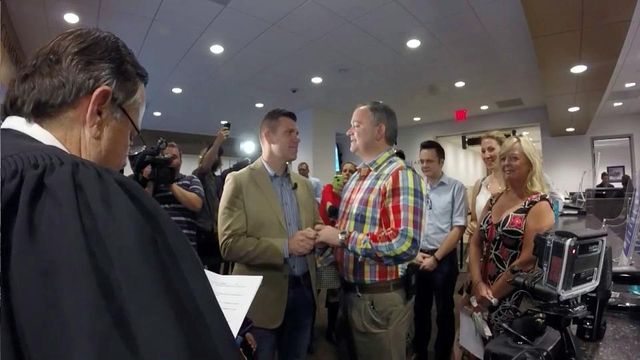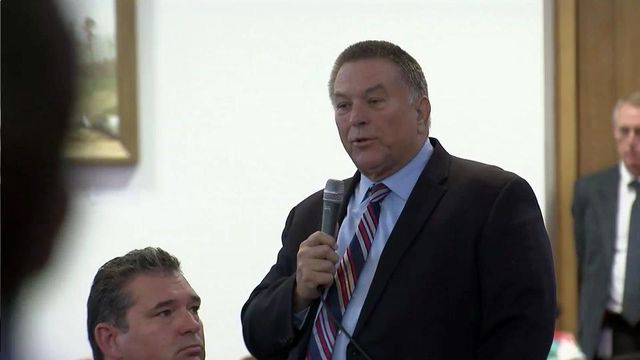Ability to opt out of performing marriages becomes NC law
With no warning and no debate allowed, the House voted Thursday morning to override Gov. Pat McCrory's veto of Senate Bill 2, allowing magistrates and county register of deeds employees to opt out of performing marriages for religious reasons.
Posted — UpdatedThe veto override has been on the House calendar for more than a week, but House Republican leaders did not have the needed votes – three-fifths of the members present must approve an override for it to take effect – until Thursday.
With 110 members present and voting, the override required 66 votes. The final vote was 69-41.
The Senate overrode the veto last week, so the measure now becomes law.
Senate Bill 2 is intended to allow magistrates and register of deeds office staffers who object to same-sex marriage to refuse to perform any marriages. The workers don't have to opt out in advance – he or she can refuse to serve a couple at the time they go to obtain a marriage license or go before the bench for a civil wedding – and the worker opting out would then be barred from performing all marriages for at least six months.
Supporters say it protects the religious rights of magistrates and county employees. But critics say it allows public servants to decide which of their job duties to perform and for which taxpayers to perform them.
Rep. Paul "Skip" Stam, R-Wake, made the motion to override McCrory's veto, calling the governor's argument a "logical fallacy." McCrory had said that government workers need to uphold their oath of office and perform duties, but Stam has argued that federal employment laws require accommodations be made for workers' religious beliefs.
After Stam's motion, Rep. David Lewis, R-Harnett, used a parliamentary maneuver known as "calling the question" to cut off debate.
Under the rules, each caucus leader gets three minutes after the question is called. House Majority Leader Mike Hager did not speak in favor of the override, but House Minority Leader Larry Hall blasted it.
"The bill would sanction state employees being released from their sworn duty to the citizens of the state of North Carolina," Hall, D-Durham, said, "taking a sacred oath and then willy-nilly at their convenience deciding they will not uphold that.
"It creates second-class citizens with the sanction of the government, which we should not be doing," he said. "We owe more to the citizens of North Carolina, we owe more to the taxpayers, and we owe more to the value of an oath to the citizens and the state."
A combination of absences and switched votes secured the override.
The House voted 67-43 on May 28 to initially pass the bill. Five Republicans (Reps. Craig Horn of Union County, Linda Johnson of Cabarrus County, Donnie Lambeth of Forsyth County, Chris Malone of Wake County and Roger West of Cherokee County) and one Democrat (William Brisson of Bladen County) who were absent for that vote cast votes Thursday in favor of the override, while three Republicans who voted no on May 28 (Reps. John Bradford and Charles Jeter, both of Mecklenburg County, and Jon Hardister of Guilford County) were absent Thursday.
Two other Republicans who voted yes on the first vote opposed the override (Reps. Rick Catlin of New Hanover County and Leo Daughtry of Johnston County), while a third who initially voted no on the bill supported the override (Rep. John Fraley of Iredell County).
McCrory said he was disappointed in the General Assembly's action.
"It’s a disappointing day for the rule of law and the process of passing legislation in North Carolina," he said in a statement. "I will continue to stand up for conservative principles that respect and obey the oath of office for public officials across our state and nation."
At the close of the House session, Rep. Cecil Brockman, D-Guilford, stood to say, "I would just like to personally apologize to all the gay and lesbian couples in North Carolina."
He was swiftly ruled out of order by House Speaker Tim Moore and ordered to sit down.
Later, Brockman completed his apology during a news conference by House Democrats.
"We’re sorry on behalf of the state of North Carolina," he said. "I think anybody who feels any kind of compassion to their neighbor, their community, would stand up and say something because it doesn’t make any sense. We live in 2015."
Outside groups on both sides of the debate were quick to respond to the override.
"This is a sad day for North Carolina that history will not judge kindly,” Sarah Preston, acting executive director of the ACLU of North Carolina, said in a statement. “Just eight months after our state extended the freedom to marry to same-sex couples, extremist lawmakers have passed discrimination into law, allowing government officials to deny marriage services to virtually any couple. This shameful backlash against equality will make it harder for all couples in our state to marry and force many to spend what is supposed to be a happy day trapped in a maze of government offices."
"All North Carolinians now have the possibility of being denied the services of a magistrate or register of deeds," Chapel Hill Mayor Mark Kleinschmidt, who is openly gay, said in a statement. "Couples that include a divorced person, interracial couples, couples from different faiths, as well as same-sex couples, have historically faced condemnation based on the religious beliefs of others."
Kleinschmidt said Chapel Hill and other Orange County towns are exploring their legal options to oppose the new law, and lawyers for the Campaign for Southern Equality predicted it would be challenged in court.
"This law is nothing more than state sanctioned discrimination. It is a terribly misguided attempt to rewrite what equal protection under the law means. Equality and fairness are not principles that are decided on a case-by-case basis, dependent upon who happens to be working the counter on a particular day," said Jake Sussman, a Charlotte attorney who represented ministers in their lawsuit to strike down North Carolina's constitutional amendment against same-sex marriage.
Senate President Pro Tem Phil Berger, the chief sponsor of the legislation, he believes the new law is constitutional and will withstand a legal challenge. Counties will have to find someone else to perform marriages in the absence of magistrates, he said, although that could take some time.
"What the bill does is it provides a balance," said Berger, R-Rockingham. "(It) does not stop anyone from getting married who wants to get married, does not require our magistrates and our registers of deeds employees to violate their firmly held religious convictions."
Gay marriage opponents praised the veto override.
"It's hard to believe that any governor, much less a conservative one, would veto a bill protecting the religious freedoms of his constituents. The House and the Senate made the right call in overriding Gov. McCrory's ill-advised veto, and we are grateful for their continued leadership in fighting to preserve this fundamental American freedom," Tami Fitzgerald, executive director of the North Carolina Values Coalition, said in a statement.
Regardless of the legal future of the law, Equality NC director Chris Sgro said it has already damaged North Carolina's image.
"A handful of extreme legislators are giving the state of North Carolina a black eye and are really going to hinder our ability to do business in the national sphere," Sgro said.
Berger disagreed, noting the Utah implemented a similar measure with little fallout.
"I actually think there’s a group of activists that are ginning up this issue (in North Carolina)," he said. "That’ll probably continue to last for a while, but I don’t see it as being a negative for the state at all."






